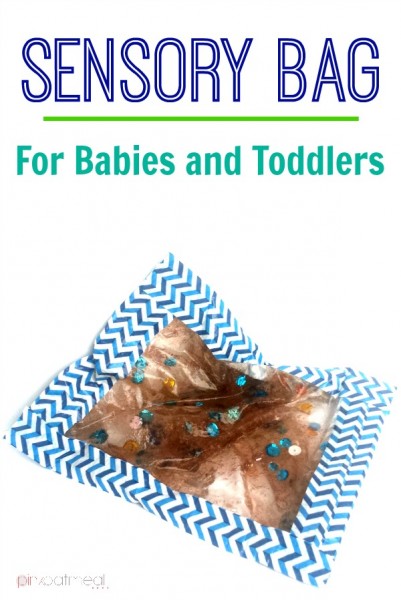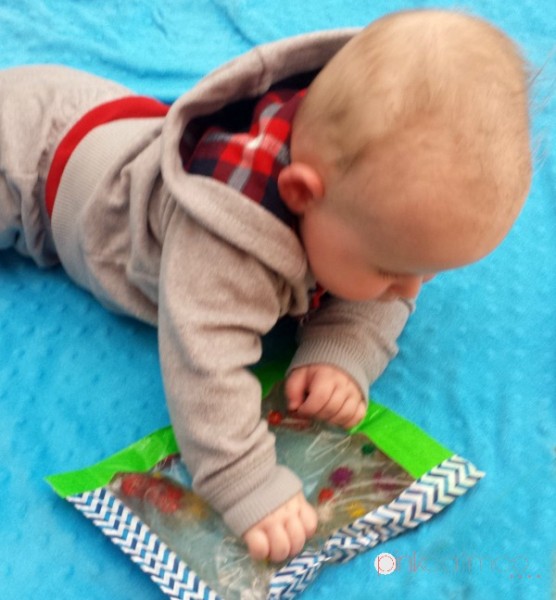http://www.stillplayingschool.com/2013/02/the-importance-and-purpose-of-infant.html
The sense of touch is the first sense to develop in the womb. Interestingly, it will also be the last sense to diminish in our old age.
Because of this, it is the primary way that babies learn and socialize. Kisses, hugs, and cuddles are all sensory ways that babies bond with their families, driven primarily by touch, but also incorporating smell, sight, and sound. (And with eventual open mouthed baby kisses even taste!)
Touch helps babies learn about the environment around them as well as who they are as an individual in space and time.
Giving different textures to explore will also encourage a baby to start reaching for and grasping objects which is the next physical milestone on the horizon.

http://plainvanillamom.com/2012/04/sensory-bag-for-baby.html
DIY SENSORY BAG
Needed
Freezer Bags (size)
Hair Gel
Duct Tape
Fill up the freezer bag with hair gel.
Add anything you would like to the freezer bag for a little something for the baby to look at. I added sequence to one bag and poms to another.
Next I sealed the bags with duct tape around all four sides. I went over with the duct tape twice – it may be overkill but I wanted to be sure. I liked to jazz it up a bit when it came to the duct tape!
If you really want to make sure that the bag is secure you can add contact paper around the outside of the bag.
That’s it! You have your sensory bag(s) for your baby to enjoy!

A great activity to encourage tummy time!

Like most things the bag found its way to his mouth! This activity should always be supervised when playing with baby. It’s also a good reason why you want to make sure that your bag is secure so your baby can’t bite through it.
4 Messy Sensory Activities
1. Cloud Dough
Cloud dough is made up of two common household items, flour and oil. I first read about cloud dough on Flights of Whimsy and followed the recipe exactly. After that first experience I switched to using cooking oils, because they can be safely ingested. Please do not use baby oil with babies and young toddlers.
Ingredients:
- flour
- cooking oil
Directions:
Combine 8 cups of flour for every 1 cup of oil. For a smaller bin cut the recipe in half.
.jpg&container=blogger&gadget=a&rewriteMime=image%2F*)
Combine 8 cups of flour for every 1 cup of oil. For a smaller bin cut the recipe in half.
.jpg&container=blogger&gadget=a&rewriteMime=image%2F*)
2. Oobleck
Oobleck is also made using a common pantry staple.
Ingredients:
Oobleck is also made using a common pantry staple.
Ingredients:
- cornstarch
- water
Directions:
Combine equal parts of cornstarch and water, or slightly more cornstarch than water. I add water to cornstarch slowly until I get the consistency I want. I can always add more water, but I usually have a set amount of cornstarch on hand. You don’t want the Oobleck too runny. Mix well with your hands until you can scoop a handful of Oobleck and almost make a ball. The ball quickly turns to a liquid and drips through your hands. The Oobleck should feel solid in your hands for a second.
.JPG)
3. Cooked Pasta
Cooked pasta is one of the easiest and safest ways to make a sensory bin for babies who are old enough to eat solids.
Ingredients:
- pasta
- food coloring
Directions:
Cook pasta according to directions. You can choose to add food coloring to the water while boiling or add food coloring to the pasta after cooking and mix well. Store the pasta in an airtight container in the fridge to reuse for up to a week.
4. Jello
Ingredients:
Jello or Gelatin
Directions:
Cook according to package instructions. Add colors or spices as desired.

Jello is so easy to make and clean! We limit jello play to avoid the artificial ingredients and sugars, but it is fun to bring out once in awhile. Jello is squishy, colorful, bouncy, sticky, and it has such a sweet scent. I like using Gelatin, so I can color and flavor it myself.
Ingredients:
Jello or Gelatin
Directions:
Cook according to package instructions. Add colors or spices as desired.


Interesting Article. Hoping that you will continue posting an article having a useful information. Benefits of Gardening with Children
ReplyDelete